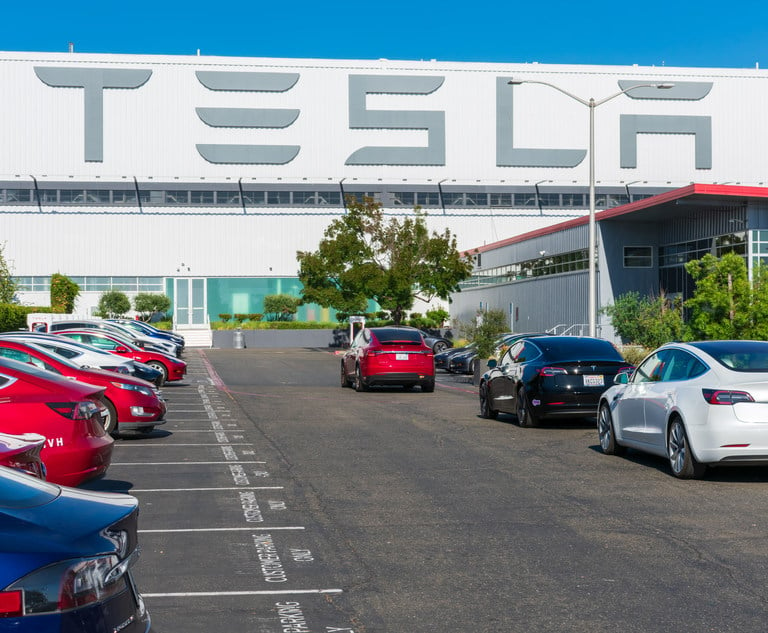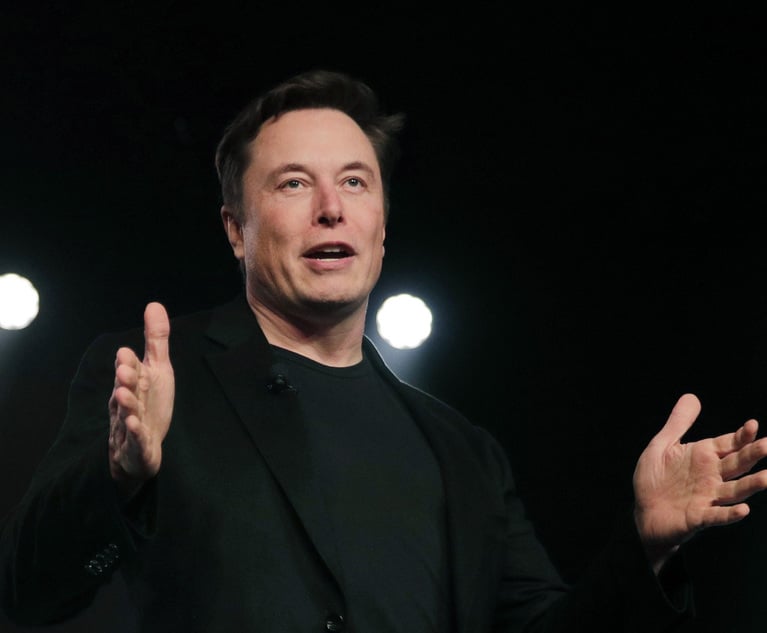 Tesla electric car charging stations in the parking lot of the Chesapeake House rest area along I-95 in Maryland. Photo: Diego M. Radzinschi/ALM
Tesla electric car charging stations in the parking lot of the Chesapeake House rest area along I-95 in Maryland. Photo: Diego M. Radzinschi/ALM Investors Sue Over Alleged Adviser Conflicts in $218M Tesla Acquisition
The class-action complaint, filed by Maxwell investor Davis Rodden, targeted the company's board and sought additional discloses about Barclays Capital Inc.'s current and prior engagements outside of the all-stock deal, which was announced last month.
March 05, 2019 at 04:50 PM
4 minute read
An investor at Maxwell Technologies Inc. on Monday lodged the latest challenge to Tesla's planned $218 million acquisition of the small manufacturer of energy-storage products, saying that the Maxwell board had failed to disclose information regarding potential conflicts by the firm's financial adviser.
The class-action complaint, filed by Maxwell investor Davis Rodden, targeted the company's board and sought additional discloses about Barclays Capital Inc.'s current and prior engagements outside of the all-stock deal, which was announced last month.
In the filing, Rodden and his attorneys said San Diego-based Maxwell had agreed to pay Barclays $4.87 million for advisory services, with most of the investment bank's compensation contingent on the deal's completion. The information, they said, was “patently material” to stockholders' upcoming determination on whether to support the transaction.
“In order to fairly assess the proposed transaction and determine how to respond to the offer, and to assess whether to rely on Barclays' fairness opinion in making that determination, Maxwell stockholders, such as plaintiff, are entitled to know all material information concerning Barclays' conflicts of interest,” the complaint said.
“Without disclosure of this information, Maxwell stockholders are left guessing as to whether Barclays' conflicts of interest tainted the process, and will be unable to make an informed decision as to the proposed transaction and determine how to respond to the offer.”
According to court documents, on Feb. 3 the Maxwell board approved Tesla's offer to acquire the firm at a value of $4.75 per share, in a deal that would give Tesla and CEO Elon Musk access to Maxwell's stock of ultracapacitors, which store and transfer energy more effectively than than traditional primary energy sources.
Maxwell's products are largely geared toward automotive, heavy transportation and renewable energy applications.
“We believe this transaction is in the best interests of Maxwell stockholders and offers investors the opportunity to participate in Tesla's mission of accelerating the advent of sustainable transport and energy,” Maxwell chief executive officer Franz Fink said in a press release at the time.
A company spokesman, reached for comment Tuesday, said it was “Maxwell Technologies' practice not to comment on ongoing legal matters.”
Last month, a separate group of Maxwell investors sued in San Diego federal court to halt the deal, saying the process was “unfair” to investors.
The Chancery Court lawsuit, on the other hand, asks for additional disclosures for stockholders—a type of case that has gone out of style in Delaware after the state Supreme Court affirmed the Chancery Court's landmark rulings in the cases In re Trulia Stockholder Litigation and Corwin v. KKR Financial Holdings.
As a result, attorneys and observers in Delaware have noted that class actions stemming from mergers, once a staple of the Chancery Court docket, have migrated to federal courts around the country, amid heightened scrutiny from state court judges. In the Court of Chancery, the cases are now evaluated on whether the disclosures in question alter the “total mix” of information available to investors.
Rodden is represented in the case by Blake A. Bennett of Cooch & Taylor Attorneys at Law in Wilmington and D. Seamus Kaskela of Kaskela Law in Newtown Square, Pennsylvania.
An online docket-tracking service did not list counsel for the Maxwell directors.
The case, captioned Rodden v. Bilodeau, has not yet been assigned to a judge.
|This content has been archived. It is available through our partners, LexisNexis® and Bloomberg Law.
To view this content, please continue to their sites.
Not a Lexis Subscriber?
Subscribe Now
Not a Bloomberg Law Subscriber?
Subscribe Now
NOT FOR REPRINT
© 2024 ALM Global, LLC, All Rights Reserved. Request academic re-use from www.copyright.com. All other uses, submit a request to [email protected]. For more information visit Asset & Logo Licensing.
You Might Like
View All

Tesla Shareholders Move to Consolidate Cases Over Musk's Focus on X, AI
4 minute read
'When Does It End?' Chancellor Asks Defense Counsel in Dispute Over Musk Compensation
5 minute read
Elon Musk's Latest Tesla GC Shows Staying Power Despite Tricky Role
Trending Stories
- 1How to Support Law Firm Profitability: Train Partners Up
- 2Elon Musk Names Microsoft, Calif. AG to Amended OpenAI Suit
- 3Trump’s Plan to Purge Democracy
- 4Baltimore City Govt., After Winning Opioid Jury Trial, Preparing to Demand an Additional $11B for Abatement Costs
- 5X Joins Legal Attack on California's New Deepfakes Law
Who Got The Work
Michael G. Bongiorno, Andrew Scott Dulberg and Elizabeth E. Driscoll from Wilmer Cutler Pickering Hale and Dorr have stepped in to represent Symbotic Inc., an A.I.-enabled technology platform that focuses on increasing supply chain efficiency, and other defendants in a pending shareholder derivative lawsuit. The case, filed Oct. 2 in Massachusetts District Court by the Brown Law Firm on behalf of Stephen Austen, accuses certain officers and directors of misleading investors in regard to Symbotic's potential for margin growth by failing to disclose that the company was not equipped to timely deploy its systems or manage expenses through project delays. The case, assigned to U.S. District Judge Nathaniel M. Gorton, is 1:24-cv-12522, Austen v. Cohen et al.
Who Got The Work
Edmund Polubinski and Marie Killmond of Davis Polk & Wardwell have entered appearances for data platform software development company MongoDB and other defendants in a pending shareholder derivative lawsuit. The action, filed Oct. 7 in New York Southern District Court by the Brown Law Firm, accuses the company's directors and/or officers of falsely expressing confidence in the company’s restructuring of its sales incentive plan and downplaying the severity of decreases in its upfront commitments. The case is 1:24-cv-07594, Roy v. Ittycheria et al.
Who Got The Work
Amy O. Bruchs and Kurt F. Ellison of Michael Best & Friedrich have entered appearances for Epic Systems Corp. in a pending employment discrimination lawsuit. The suit was filed Sept. 7 in Wisconsin Western District Court by Levine Eisberner LLC and Siri & Glimstad on behalf of a project manager who claims that he was wrongfully terminated after applying for a religious exemption to the defendant's COVID-19 vaccine mandate. The case, assigned to U.S. Magistrate Judge Anita Marie Boor, is 3:24-cv-00630, Secker, Nathan v. Epic Systems Corporation.
Who Got The Work
David X. Sullivan, Thomas J. Finn and Gregory A. Hall from McCarter & English have entered appearances for Sunrun Installation Services in a pending civil rights lawsuit. The complaint was filed Sept. 4 in Connecticut District Court by attorney Robert M. Berke on behalf of former employee George Edward Steins, who was arrested and charged with employing an unregistered home improvement salesperson. The complaint alleges that had Sunrun informed the Connecticut Department of Consumer Protection that the plaintiff's employment had ended in 2017 and that he no longer held Sunrun's home improvement contractor license, he would not have been hit with charges, which were dismissed in May 2024. The case, assigned to U.S. District Judge Jeffrey A. Meyer, is 3:24-cv-01423, Steins v. Sunrun, Inc. et al.
Who Got The Work
Greenberg Traurig shareholder Joshua L. Raskin has entered an appearance for boohoo.com UK Ltd. in a pending patent infringement lawsuit. The suit, filed Sept. 3 in Texas Eastern District Court by Rozier Hardt McDonough on behalf of Alto Dynamics, asserts five patents related to an online shopping platform. The case, assigned to U.S. District Judge Rodney Gilstrap, is 2:24-cv-00719, Alto Dynamics, LLC v. boohoo.com UK Limited.
Featured Firms
Law Offices of Gary Martin Hays & Associates, P.C.
(470) 294-1674
Law Offices of Mark E. Salomone
(857) 444-6468
Smith & Hassler
(713) 739-1250






